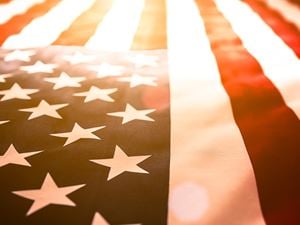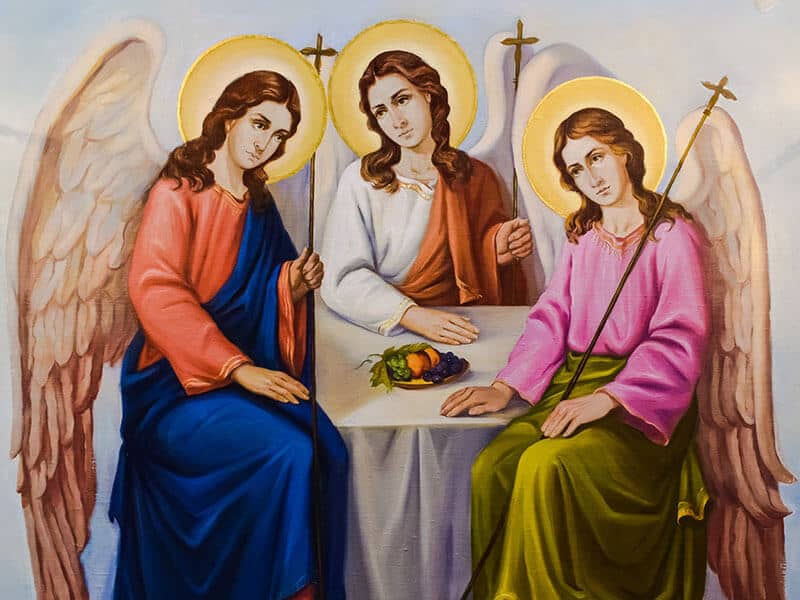
Many of the founding fathers came from Christian backgrounds which influenced their beliefs and principles. Religion is a part of our country’s heritage. These same principles and beliefs were foundational in the documents and events that founded this great country. We can gather from the founder’s words that our country was established as one nation under God.
Many of the founding fathers had Christian backgrounds and statements that they made regarding the foundation of our country are rooted in faith. As we celebrate our country’s freedom and independence, here are seven quotes from America’s founding fathers that are rooted in Christianity and faith:
“Is it not that in the chain of human events, the birthday of the nation is indissolubly linked with the birthday of the Savior? – that it forms a leading event in the progress of the Gospel dispensation? Is it not that the Declaration of Independence first organized the social compact on the foundation of the Redeemer’s mission upon earth? – that it laid the cornerstone of human government upon the first precepts of Christianity?” –John Quincy Adams
In this quote from John Quincy Adams’ 4th of July address, Adams is speaking to the fact that the United States is the only nation in history established by mostly Christian people, founded upon Biblical Natural Law principles and dedicated to the purpose of religious and personal liberty and equal justice under the law for all men. This truth is observed within America’s earliest history.
“Righteousness alone can exalt [America] as a nation. Reader! Whoever thou art, remember this; and in thy sphere practice virtue thyself, and encourage it in others… [T]he great pillars of all government and of social life: I mean virtue, morality, and religion. This is the armor, my friend, and this alone, that renders us invincible.” –Patrick Henry
While most of us remember Patrick Henry for seven little words, “Give me liberty, or give me death!,” Henry only cared to be remembered for his 1765 Stamp Act Resolves that set the colonies up for Independence. He penned the above note to future Americans. Henry was quoting the wisdom of Proverbs 14. His speeches and correspondence were lined in Scripture. He knew that righteousness alone could exalt America, but he also knew that righteousness doesn’t come naturally to men. Aware of this, Henry and the other founding fathers sought a new way to govern. They wanted to found a nation governed in an entirely new way. It would be a government beholden to its people – not a people beholden to the government – with only God as America’s autonomy.
“We have no government armed with power capable of contending with human passions unbridled by morality and religion. Our Constitution was made only for a moral and religious people. It is wholly inadequate to the government of any other.” – John Adams
John Adams made this statement in an October 13, 1789 address to the military. There is also other evidence that faith was foundational in Adam’s life, expressed not only through his actions, but also his words. On March 6, 1789, Adams called for a national day of fasting and prayer for the country to “call to mind our numerous offenses against the most high God, confess them before Him with the sincerest penitence, implore his pardoning mercy, through the Great Mediator and Redeemer…”
“And can the liberties of a nation be thought secure when we have removed their only firm basis, a conviction in the minds of the people that these liberties are of the gift of God? That they are not to be violated but with His wrath? Indeed I tremble for my country when I reflect that God is just; that his justice cannot sleep forever.” – Thomas Jefferson
Thomas Jefferson was a big supporter of religious liberty. Because of this, he made sure that church and state stayed separate in American politics. Although Jefferson was reluctant to talk about his personal beliefs in public, his private letters revealed that he was a deeply spiritual man who spent quite a considerable time thinking about God.
“While we are zealously performing the duties of good citizens and soldiers, we certainly ought not to be inattentive to the higher duties of religion. To the distinguished character of Patriot, it should be our highest glory to add the more distinguished character of Christian.” –George Washington
This is the statement Washington made in his address to the Continental Army before the Battle of Long Island on August 27, 1776. Washington’s sense of morality was grounded in the Bible and his belief in God. While leading the American army during the Revolutionary War, Washington demanded that his men act with integrity, morality and honesty. He wanted his men to be more than good soldiers. During the course of the war, Washington’s character helped sustain his troops. He hoped and trusted “that every officer and man will endeavor and act as becomes a Christian soldier, defending the dearest rights and liberties of our country.”
“Before any man can be considered as a member of civil society, he must be considered as a subject of the Governor of the Universe.” –James Madison
In 1784, Patrick Henry submitted to the Virginia legislature a bill that would have imposed a tax upon Virginians for the support of ministers of their choice. James Madison opposed the law as a violation of the free exercise of religion guaranteed in the Virginia Declaration of Rights. Madison explained his objections to Henry’s bill in his “Memorial and Remonstrance Against Religious Assessments” in 1785. In this statement, quoted above, he argued that the exercise of faith must be directed only by the conscience of the individual.
“To the kindly influence of Christianity we owe that degree of civil freedom, and political and social happiness, which mankind now enjoys…Whenever the pillars of Christianity shall be overthrown, our present republican forms of government – and all blessings which flow from them – must fall with them.” –Jedidiah Morse
In a sermon delivered by Morse on April 25, 1799, he described the depth to which Christianity and our American government are intertwined. He explained that we face two kinds of dangers: those that our religion and those that affect our government. They are so closely allied that they cannot, with propriety, be separated, he said.
Our founding fathers had a lot to say about faith and God. While the Declaration of Independence is not a Christian document and the Constitution only has one to direct reference to God “in the year of our Lord” Baylor University history professor Thomas S. Kidd argues that religion played a much larger role in influencing the ideas and principles that became bedrocks of the nation. In an interview with U.S. News, Kidd discussed the role religion played during the Revolutionary era. Kidd says, “It’s there in ideas that help to motivate and unite the Revolution, most importantly the idea that all men are created equal that [Thomas] Jefferson articulates in the Declaration of Independence.” The founding father’s trusted in God and that played a huge role in the foundation of this country.

